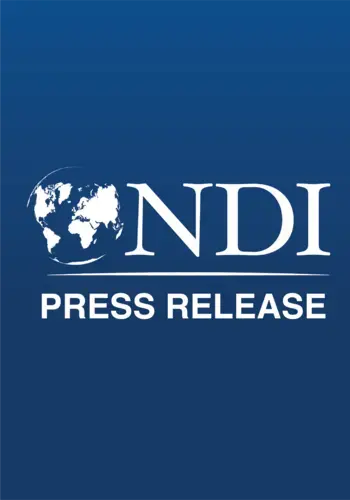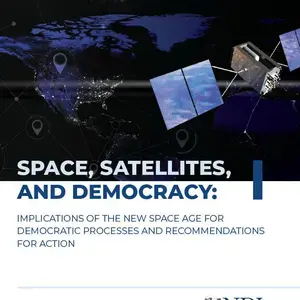The Aspen Institute Stevens Initiative today announced the award of a 1-year grant to the National Democratic Institute (NDI), one of 10 new projects funded through a national competition to use virtual exchange to increase cross-cultural understanding and equip young people to participate in a global economy.
NDI is among the first wave of virtual exchange programs to be funded by the Stevens Initiative, a public-private partnership designed to increase people-to-people exchange between youth in the United States and the Middle East and North Africa as a lasting tribute to the legacy of Ambassador Chris Stevens.
Virtual exchanges uses technology for sustained, people-to-people education programs. The Initiative aims to increase mutual understanding between youth in middle school through post-secondary and equip a generation of globally minded youth with the skills they need to succeed in an increasingly interdependent world.
The announcement marks the first major step in the Stevens Initiative’s plan to scale up people-to-people exchanges between youth in the United States and the Middle East and North Africa. The Initiative provided $5 million to support online programs that will bring more than 20,000 young people together to engage in cross-cultural learning experiences. The programs reach 17 countries in the Middle East and North Africa and 25 American states.
Under the Stevens Initiative, NDI – through an existing partnership with Stanford University – will adapt a free, open online course called the Technology for Accountability Lab for a dual-language audience of English and Arabic speakers. From this course, NDI will select 200 applicants for a special mentorship track in which teams of participants will collaborate on bilingual videos about prospective ‘civic tech’ projects. The teams responsible for the top video submissions will be selected for a study trip to Washington, D.C., and Silicon Valley to connect with technologists, policymakers, elected officials, and civic innovators.
Other examples of the work to be undertaken include:
- Online English, Arabic, and Kurdish language exchange between students in California and their peers in Morocco and Saudi Arabia;
- Storytelling through virtual reality for middle and high school students in Kentucky, New York, and Jordan, including Syrian refugees;
- A collaborative anthropological project between high school students in Morocco and Chicago;
- Global leadership activities for students in Iraq, Illinois, North Carolina, Oklahoma, Washington, and Wisconsin.
- An online program exploring how the media portrays people in the United Arab Emirates and various states across the United States.
Most programs will launch in Spring 2016 and continue for a period of two years.
“This is the beginning of a global classroom. NDI will be a pioneer in an exciting and dynamic field,” said Elliot Gerson, Executive Vice President of the Aspen Institute. “Our vision is to spark conversations between young people in countries around the world—to exchange ideas and information and to work together on addressing important issues. We look forward to working with NDI to achieve this vision.”
The first Stevens Initiative award competition was open to U.S. non-profit organizations. In addition to holding future rounds of the award competition, the Initiative will share best practices and support research to address which methods have a measurable impact and have the potential to reach all young people as the field grows.
“Civic technology has the potential to transform the relationship between citizens and their governments in positive ways. Equipping the next generation of women and men leaders with the technical skills to improve the lives of their communities is a key element of NDI’s mission,” said NDI President Kenneth Wollack. “The cross-cultural format of this initiative contributes to greater understanding and collaboration across cultural lines -- something that is critically important in our increasingly interconnected world. It also provides an opportunity to honor the legacy of Ambassador Stevens.”
Stanford University is partnering with NDI on the development and implementation of the dual-language course and mentorship track, and it will also host study trip participants. The Institute for Representative Government will engage its network of former Members of Congress to share their perspectives on effective and innovative policymaking through the virtual and in-person exchanges.
“There is a universal aspiration for democracy, human rights, and good governance, and we have abundant public opinion survey evidence to demonstrate that this aspiration is not culturally limited,” said Larry Diamond, senior fellow at the Freeman Spogli Institute for International Studies and former director of the Center for Democracy, Development and the Rule of Law at Stanford University. “I have long believed that technology has the potential to be a game-changing tool in helping people realize these aspirations. This initiative will provide an opportunity to share models for using technology to advance accountability with a young generation of civic technologists in the U.S. and in the Middle East and North Africa.”
Institute for Representative Government Executive Director Peter Weichlein added, “Our board of directors consists of a bipartisan group of former Members of Congress, who regularly engage with youth leaders through programs like the ‘Congress to Campus’ program of the U.S. Association of Former Members of Congress. We are thrilled to be part of an initiative that provides young people with additional skills for democratic participation, whether it leads to a career in public service and politics or to simply being a more active citizen.”
In addition to NDI, the other Stevens Initiative grantees announced today are:
Chicago Sister Cities International, Eurasia Foundation, Global Nomads Group, IEARN, Soliya, State University of New York – Center for Collaborative Online International Learning, University of California Berkeley, Wofford College, and World Learning.
NDI is a nonprofit, nonpartisan, nongovernmental organization that has supported democratic institutions and practices in every region of the world for more than three decades. Since its founding in 1983, NDI and its local partners have worked to establish and strengthen political and civic organizations, safeguard elections, and promote citizen participation, openness and accountability in government.
The Stevens Initiative is a public-private partnership designed to increase people-to-people exchange between youth in the United States and the Middle East and North Africa as a lasting tribute to the legacy of Ambassador Chris Stevens. By fostering structured online engagements between young people in secondary through post-secondary education, the Stevens Initiative aims to increase mutual understanding and equip a generation of globally minded youth with the skills they need to succeed in the 21st century.
Housed at the Aspen Institute, the Stevens Institute is a collaboration between the family of Ambassador J. Christopher Stevens, the U.S. Department of State, the Bezos Family Foundation, the MacArthur Foundation, the governments of the United Arab Emirates, Qatar, Algeria, and Morocco, and Microsoft, Twitter, Mozilla, and GoPro. Visit them at www.stevensinitiative.org.



